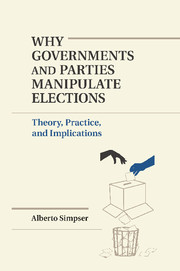Crossref Citations
This Book has been
cited by the following publications. This list is generated based on data provided by Crossref.
Libman, Alexander
Schultz, André
and
Graeber, Thomas
2012.
Tax Return as a Political Statement.
SSRN Electronic Journal,
2013.
Constitutions in Authoritarian Regimes.
p.
1.
Gehlbach, Scott
and
Simpser, Alberto
2013.
Electoral Manipulation as Bureaucratic Control.
SSRN Electronic Journal,
Schuler, Paul J.
Gueorguiev, Dimitar
and
Cantu, Francisco
2013.
Risk and Reward: The Differential Impact of Authoritarian Elections on Regime Decay and Breakdown.
SSRN Electronic Journal,
Eggers, Andrew
Folke, Olle
Fowler, Anthony
Hainmueller, Jens
Hall, Andrew B.
and
Snyder, James M.
2013.
On the Validity of the Regression Discontinuity Design for Estimating Electoral Effects: New Evidence from Over 40,000 Close Races.
SSRN Electronic Journal,
Donno, Daniela
2013.
Elections and Democratization in Authoritarian Regimes.
American Journal of Political Science,
Vol. 57,
Issue. 3,
p.
703.
Brancati, Dawn
2014.
Democratic Authoritarianism: Origins and Effects.
Annual Review of Political Science,
Vol. 17,
Issue. 1,
p.
313.
2014.
Patronal Politics.
p.
61.
Kalinin, Kirill
2014.
Linking Together Preference Falsification and Election Fraud: A Cross-National Analysis.
SSRN Electronic Journal,
Cantú, Francisco
2014.
Identifying Irregularities in Mexican Local Elections.
American Journal of Political Science,
Vol. 58,
Issue. 4,
p.
936.
Zulini, Jaqueline
and
Ricci, Paolo
2014.
The Use of Electoral Manipulation by Political Parties in Oligarchic Regimes: The Case of Brazil (190001930).
SSRN Electronic Journal,
Zulini, Jaqueline
and
Ricci, Paolo
2014.
The Use of Electoral Manipulation by Political Parties in Oligarchic Regimes: The Case of Brazil (1900-1930).
SSRN Electronic Journal,
Hyde, Susan D.
and
Marinov, Nikolay
2014.
Information and Self-Enforcing Democracy: The Role of International Election Observation.
International Organization,
Vol. 68,
Issue. 2,
p.
329.
Zakharov, Alexei V.
and
Sorokin, Constantine S.
2014.
Policy convergence in a two-candidate probabilistic voting model.
Social Choice and Welfare,
Vol. 43,
Issue. 2,
p.
429.
Ferree, Karen E.
Powell, G. Bingham
and
Scheiner, Ethan
2014.
Context, Electoral Rules, and Party Systems.
Annual Review of Political Science,
Vol. 17,
Issue. 1,
p.
421.
Norris, Pippa
Frank, Richard W.
and
Martínez i Coma, Ferran
2014.
Measuring Electoral Integrity around the World: A New Dataset.
Political Science and Politics,
Vol. 47,
Issue. 4,
p.
789.
Brancati, Dawn
2014.
Pocketbook Protests.
Comparative Political Studies,
Vol. 47,
Issue. 11,
p.
1503.
Reuter, Ora John
and
Buckley, Noah
2014.
Patrons, Clients, and Technocrats: A Study of the Effects of Regime Type on Bureaucratic Appointment Strategies.
SSRN Electronic Journal,
Distelhorst, Greg
2014.
The Power of Empty Promises: Quasidemocratic Institutions and Activism in China.
SSRN Electronic Journal,
Van Ham, Carolien
and
Lindberg, Staffan I.
2014.
Vote Buying is a Good Sign!.
SSRN Electronic Journal,



